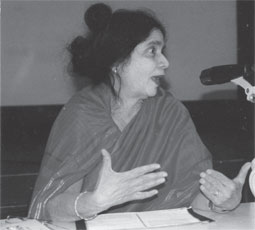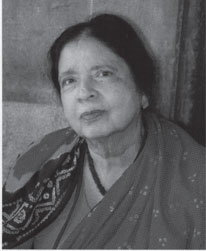|
Historicising hybrid ancestries:
A glimpse at two poems of Jean Arasanayagam
By Dilshan BOANGE
 The age of post-colonialism has offered much revisiting to be done of
how people such as us Sri Lankans could and in fact would perceive our
identity from numerous vantages ranging from language to social
behaviour to aesthetic tastes and right down to habits and preferences
in food and drink. After the advent of the western colonialists
significant changes shaped the future of the indigenous peoples of the
colonies. Thus the ‘hybrid identity’ in mind and spirit begins in the
former colonies as their peoples traverse in the path of ‘post
colonialism’. But then what of the segments who believe hybridism is
their foundation and find their rootedness in the very ironical scenario
of not being fully rooted? It is this segment that has a voice in the
poetry of Jean Arasanayagam one of Sri Lanka’s foremost literary figures
whose work marks an era of discovery for the Sri Lankan creative voice
in letters. The age of post-colonialism has offered much revisiting to be done of
how people such as us Sri Lankans could and in fact would perceive our
identity from numerous vantages ranging from language to social
behaviour to aesthetic tastes and right down to habits and preferences
in food and drink. After the advent of the western colonialists
significant changes shaped the future of the indigenous peoples of the
colonies. Thus the ‘hybrid identity’ in mind and spirit begins in the
former colonies as their peoples traverse in the path of ‘post
colonialism’. But then what of the segments who believe hybridism is
their foundation and find their rootedness in the very ironical scenario
of not being fully rooted? It is this segment that has a voice in the
poetry of Jean Arasanayagam one of Sri Lanka’s foremost literary figures
whose work marks an era of discovery for the Sri Lankan creative voice
in letters.
Jean Arasanayagam and hybridism
Better known as Jean Arasanayagam, Jean Solomons Arasanayagam is well
known in the literary sphere of Sri Lanka as a poet whose craft has gone
beyond our shores to become a voice from Sri Lanka at a regional level.
The poetry and works of prose she has produced over the years has made
her to be arguably one of the most prolific writers ever produced in Sri
Lanka. She has twelve prose works authored to her credit and published
twenty volumes of poetry, her most recent work being The World Never
Dies.
In school syllabi her pieces of poetry such as ‘Ruined Gopuram’ may
be read for the thematic significance of war and ethnic confrontations
within Sri Lanka, and in the Colombo University English department her
work is read in contexts of Sri Lankan women’s writing and as part of
postcolonial writing. The focus of the latter is to do mainly with how
she deals with the idea of a hybrid identity not merely on the more
symbolic basis of speaking an indigenous vernacular while sporting
western attire, but how her ethnicity is interpreted.
‘Hybrid experience’
When a hybrid identity is discussed in Jean Arasanayagam’s poetry it
is almost always welded to her personal, private world of experience
that seeks to reach out to the much larger schema that builds her
present through ages past and events that though she had no say over or
cannot be made responsible for, is nevertheless apart of her legacy.
The ethno dimension portrayed in her poetry related to identity deals
with an issue perhaps much more stringent than what a present day
Sinhala or Tamil or Muslim person of Sri Lanka would have to deal with.
Does the strain of the European mark her as any less an heir to Sri
Lanka? Perhaps this is a seldom spoken issue which does not find
sufficient means for expression into the larger mainstream national
discourse of identity in the Sri Lankan fold(s).
Chosen poems
The two poems I would like to discuss in this article are
–‘Ancestors’ from the book Reddened Water Flows Clear and ‘Sundry
bloodlines’ from The Word Never Dies which have a very potent flow of
imagery interlaced with the poetesses own emotions. Before citing
examples from the texts of the poems to look at the finer details of the
word constructions I believe a cursory glance at some of the
commonalities in terms of theme that both these poems present would be
pertinent.
A few thematic lines
Finding conciliation between one’s lineal realities with the
prejudices of the mainstream perceptions, sympathy for the hardships the
European seafarers would have endured on a humanistic level, the
speculation of what conflicting ways of culture would have affected the
progenitors of the Burghers come as elements of query and wonder evoked
by Mrs. Arasanayagam in both the poems afore mentioned. On these lines
the poetess has woven her voice contemplatively looking into herself as
a possible repository of answers or means to find answers to question
that have been left unanswered by existing documented history.
Ardour for the sailor’s courage
|

Jean Arasanayagam |
 Contrary to the popular discourse of decrying the colonial invader,
the poem “Ancestors” shows the poet’s personal ardour towards the
bravery borne by the European sailor setting out to achieve his goals of
spreading Calvinistic Christianity and trade. Contrary to the popular discourse of decrying the colonial invader,
the poem “Ancestors” shows the poet’s personal ardour towards the
bravery borne by the European sailor setting out to achieve his goals of
spreading Calvinistic Christianity and trade.
“Yet it is with a kind of wonder
That I gaze at pictures of their flagships
And gallant Indiamen sail billowing
Find that they did not lack courage”
And the poet goes on to speak of evoking sympathy for the bold
seafarers imagining their plight aboard their vessel(s) without so much
as the basic comforts of hygienic food –“...although the seafarers
rotted with scurvy
And perished of their bloody fluxes, ate beef
Nibbled already by salty maggots, survived...”
Reflecting elements
A very similar vein is found in ‘Sundry bloodlines’ that draws a
parallel between the works in imagery –
“What did they eat? Maggoty meats well-salted bulging
With white crawling grubs, transparent skins blood red
and fish hauled up in nets, a silvery squirming mass..”
On the question of mixed bloodlines and an ancestry that is defined
through hybridisation the poet certainly makes a very strong point of
wondering what ‘ground’ the ‘hybrid’ Burgher identity holds in the
present context of a more national minded outlook holding foreground.
“Those original bloodlines with all their transformations,
Colour of skin, eyes, hair, shape of bone structure,
What a hotch potch of genes, the blood of many
Nations flowing through my veins, recognize the vague
Semblances to the original image looking through the
Changing mirror...” [Sundry bloodlines]
“That man, somewhere my ancestor whose name
Intrigues me slumbers in immortality
Since I will not let him die completely
He leaves some record from his Calvinistic
Loins, a whole terrain copulate with what tenacity
The hybrid growth of his seed flowering
Into this strange foliage, nourished by this soil.” [Ancestors]
Consider the cited afore extracts from the two poems in discussion in
this article. The poet certainly has a problematical picture created
through different approaches to the same topic of the hybrid identity.
In ‘Sundry bloodlines’ it’s a case of looking back and looking inwards
about the present status of mixed nationalities being fused in an
individual persona. It’s just not a matter of ‘conceptual aspects’ but
details going right down to the physical attributes that shape the
hybrid identity. Anatomy therefore becomes almost like a map for the
poetess to chart signs and symbols to unravel an elusive answer. In
‘Ancestors’ the hybridisation is looked at more to do with the
originator and how the hybridism finds its root in the very physical
being of a progenitor who himself of course was not hybrid but marked
the founding of the poetess’s own personal legacy of hybridism.
How did these westerners once set upon this land of tropical
splendour find themselves forging ahead? Surely there must have been
great incompatibility with the islanders and their ways? Yes, and the
poetess does look into those aspects as well and wonders how those early
days of adaptation must have been like. She goes onto wonder what
domestic life must have been like for those first Europeans who settled
down with local women. And as the all too familiar saying goes ‘you are
what you eat’ and as mundane as it may sound Mrs. Arasanayagam does not
forget to speculate on what culinary moulds would have prevailed in such
ethnically mixed domains!
“Did his wife learn how
To make suikebrod and poffertjes and wafel
The doughcakes rising in the breudher pans
Or did they make do with salt fish and country
Rice washed down with the local brews,” [Ancestors]
With the more prevalent foci coming in contexts of wars and politics
how many would wonder what the everyday mundane meal times of the
coloniser setting into a new life in a new land? Surely the sensitive
womanliness in the poetess has dwelt on these things that may seem to
some as trivial but nonetheless significant in charting the psyches of
those initial progenitors of her bloodlines.
Betwixt colonialism and post colonialism?
Today what legacies can the Burgher people claim when looking at the
past and facing the larger national discourse in the postcolonial
context? What speaks to the burgher conscience in light of the
objectives and intentions that brought their ancestors to these lands? A
sign of this is possibly evincible in the following lines –
“I wake from my dreams to breathe here, air that
Is fragrant with cinnamon bales and close packed
Cinnamon quills stored in the warehouse and
Bangasalas, think of the horrific punishments
Meted out to the cinnamon peelers, torture,
Death if they pilfered a plant for self gain.” [Sundry bloodlines]
Do the cited afore lines from ‘Sundry bloodlines’ fount from a guilty
conscience? Does the progeny of the western colonisers in Sri Lanka feel
there is some secret dilemma in identifying with the roots of their
ancestry from a point of moral consciousness? Yet does the poetess
apologise for the legacy of violence she is heir to by virtue of the
coloniser’s enterprise here? No, one is unlikely to find any intentional
apologies in the lines of the two poems discussed in this article, and
it seems unlikely that the poetess feels an apology is owed by her or
her contemporaries for the doings of their forbearers.
The humanistic empathy one finds in the lines of Mrs. Arasanayagam in
the two poems ‘Ancestors’ and ‘Sundry bloodlines’ speak not on the
biasness of race or power or even the moral divide of who was right and
wrong.
Her poetry comes as a singular journey into the past and to decipher
how much of it resides in her as an individual how is heir to a legacy
that may not always be seen in the light of gloriousness.
It is this very quality of trying to capture the interior of herself
in connection with her past that does have historicity but may not have
been given sufficient importance in the politics of historicising that
has made this poetess produce her own personal forms of historicising
based on researched facts as well as conjecture and imagination which
blends the roles of historian and writer on the plane of poetry. |

